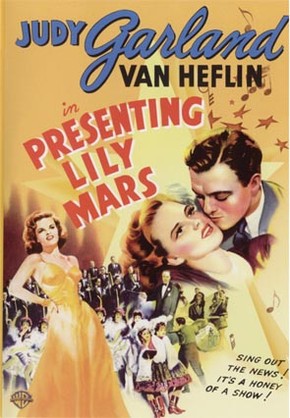Judy by the Numbers: "Caro Nome/When I Look At You"
 Wednesday, May 4, 2016 at 7:30AM
Wednesday, May 4, 2016 at 7:30AM Anne Marie is tracking Judy Garland's career through musical numbers...

With Judy Garland now such an established hit, MGM worked overtime to make the most of its musical star. This meant that while Arthur Freed and the Freed Unit "made" her by crafting her star image (and arguably used her to her best advantage), Judy couldn't work with them exclusively. She was too valuable a commodity for that. So, MGM also put her under the watchful tutelage of another producer well-known for his musical mojo: Joe Pasternak.
The Movie: Presenting Lily Mars (1942)
The Songwriters: Walter Jurmann (music) and Paul Francis Webster (lyrics)
The Players: Judy Garland, Van Heflin, Fay Bainter, Spring Byington, directed by Norman Taurog
The Story: Had Judy's fateful short with Deanna Durbin turned out differently only six years previous, she might have met Joe Pasternak earlier. For most of the 1930s, Pasternak was a top producer at Universal Studios, with major Marlene Dietrich titles such as Destry Rides Again to his credit. However, where Pasternak really made his name was in his big "get" for Universal; he was the man responsible for bringing Durbin to the studio after MGM rejected her. Under his production and guidance, Deanna Durbin became one of the biggest singing stars of the 1930s.
However, the fact remained that Universal was small potatoes next to MGM, so when Pasternak became a major musical producer it was only logical that MGM should hire him. Presenting Lily Mars was his second film for the studio. It was originally bought as a dramatic script for Lana Turner, but Pasternak convinced the studio to recycle some songs and turn it into a Judy Garland musical. Unsurprisingly, it was another hit, grossing over $3.5 million at the box office. What is surprising is that Pasternak and Garland only worked together one more time. After the near-miss six years before, it would take another six years for Judy to work with the high-spirited Hungarian again. And much would change for Judy in that six year period.



Reader Comments (11)
This movie needs to be better known. I loved it when i finally saw it a handful of years back.
The still of Judy above feels like it's the first time she appears as an adult woman in the movies. I need to track this title down. This decade was so turbulent for her (as I guess really they all were). What a fascinating life.
This is a nice song that Judy has fun with highlighting her comic sensibilities but I prefer the beautiful little number she performs with the great Connie Gilchrist on the bare stage in a closed theatre-Every Little Movement. It's just a lovely moment that isn't matched by anything else in the film.
By the way the supporting cast is an actressexual dream with besides Connie, Fay Bainter, Spring Byington and the lesser known Martha Eggerth (she's the one being parodied in this clip) all being delightful.
Judy was always fond of this film because every effort was made to glamorize her as much as possible within the confines of the story and she felt she looked the best she ever did on screen but the overall picture outside of when she's singing is a routine affair.
Around this time Pasternak did want to work with Judy again as well as Deanna. He floated the idea of a musical version of Little Women with Judy as Jo and Deanna as Meg but the project never came together partially I suspect since Universal would have been resistant to lending out its golden goose. Particularly to play the least interesting of the March sisters.
I know I've seen this but can barely remember it. Do they just not show it very much or is Van Heflin a charisma sink for Judy?
I feel like these posts are always missing information. What "fateful short" are you referring to?
Adam - Apologies, I totally forgot to link it in the post. The short was "Every Sunday," which we discussed allllllll the way back in January.
http://thefilmexperience.net/blog/2016/1/20/judy-by-the-numbers-americana.html
Sadly underseen, this one. She looked terrific and gorge in an unfamiliar way.
No worires; thanks Anne Marie! Love your posts :)
I am ashamed to say I have ever seen this which may get me kicked out of the Fan Marie's
Based on joel6 recommendation I youtubed Every Little Mivement and was charmed. I only knew of the up tempo version.
Thanyou!
*never seen. ( try to avoid posting when you are riding a commuter train)
According to Pasternak's autobiography, the six year gap in the Garland/Pasternak working relationship stemmed in part from his mistaken belief that Judy disliked him because she disliked PRESENTING LILY MARS. Pasternak felt this way because (again, according to him), Judy, because "she listened to the wrong people," went behind his back to complain to MGM executives, including L.B. Mayer, that LILY was too small scale and would set her burgeoning solo star career back.
As a result, Mayer called Pasternak into his office and told him the film needed a big splashy finale that showed LILY as a star. This became the elaborate "Broadway Rhythm" number where she dances with Charles Walters and fronts a chorus of dancers with Tommy Dorsey and his Orchestra playing over their heads. Pasternak acquiesced and the number was turned entirely over to the Freed Unit.
Judy never said anything to Pasternak about it, so, when Judy was suggested as a replacement for June Allyson in IN THE GOOD OLD SUMMERTIME, Pasternak said they'd better check with her because he thought she didn't like him. A meeting was arranged between the two of them and the air was cleared. If Allyson hadn't gotten pregnant, the estrangement/misunderstanding between Judy and Joe might have been even longer.